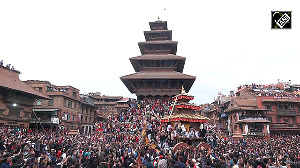Chief of the Indian Space Research Organisation K Radhakrishnan, while commenting on the failure of the latest communication satellite GSAT-5P onboard homegrown GSLV-F06 powered by a Russian cryogenic engine, said that the vehicle faced problems 50 seconds after its launch.
"The command for aborting the launch was issued when the vehicle was at an altitude of 8 km and 2.5 km away from Sriharikota. The satellite launch failed because control and command did not reach the activation system," said the ISRO chief.
This failure has worried ISRO authorities since India's second moon mission, the much-hyped Chandrayan 2, will be launched in a GSLV. Chandrayan 1 detected the presence of water on the moon and the second mission is expected to return with soil samples from the lunar surface.
The rocket, which blasted off at approximately 4 pm from the second launch pad at the Satish Dhawan Space Centre at Shriharikota, was hit by technical snag in the first stage.
According to initial reports and available data, large altitude errors lead to a higher structural load and hence the vehicle broke. The rocket exploded when scientists in charge pressed the self-destruct button, and they are investigating the cause of the failure.
"There are many aspects that we need to look into," Radhakrishnan added.
According to the ISRO chief, the mission's failure had nothing to do with the delay in the launch. The mission was originally slated to be carried out on December 20, but it was postponed to December 25. ISRO authorities had sorted out the issue and the mission was given a go-ahead only after all the necessary parameters were met by the vehicle, he said.
Speaking on Chandrayan 2, Radhakrishna said that it will be launched by 2013-2014 and it will require a GSLV rocket. "We need to work on the cryogenic stage and other parameters. We will be closely working on these aspects and are hopeful of a successful launch," he said.








 © 2025
© 2025